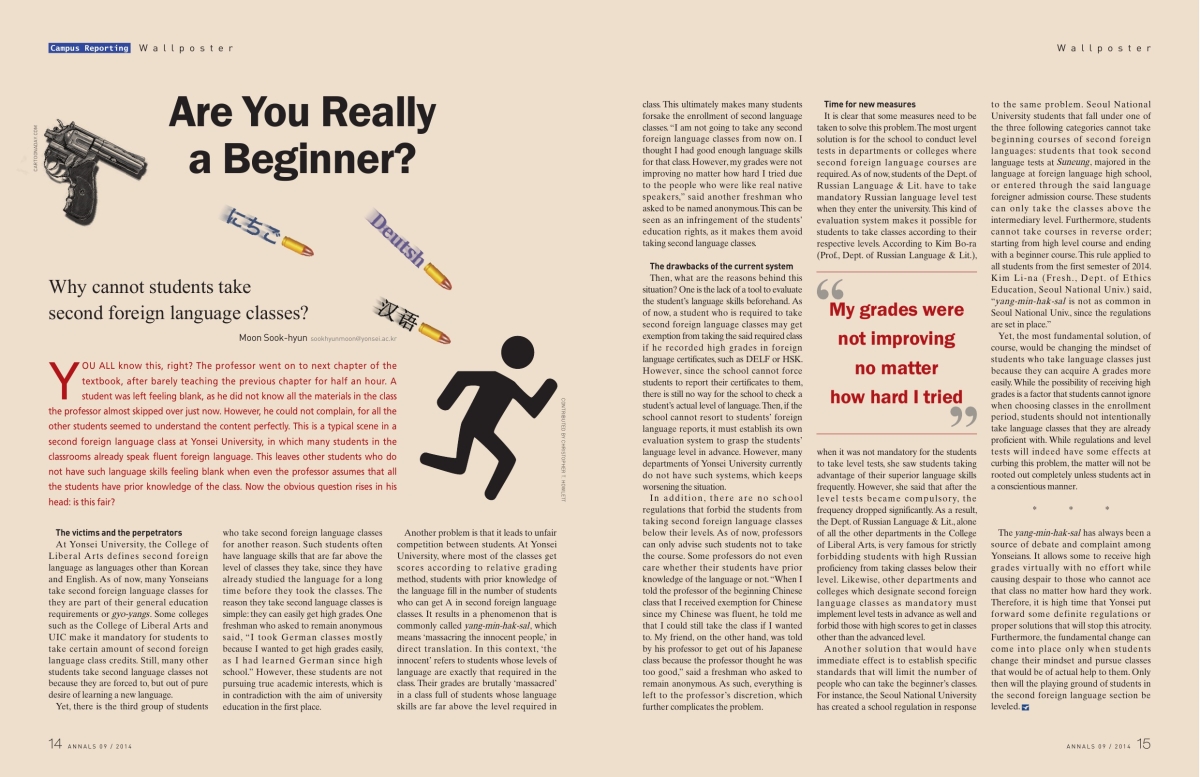Why students cannot take second foreign language classes


YOU ALL know this, right? The professor went on to next chapter of the textbook, after barely teaching the previous chapter for half an hour. A student was left feeling blank, as he did not know all the materials the professor skipped over just now. However, he could not complain, for all the other students seemed to understand the content perfectly. This is a typical scene in a second foreign language class at Yonsei University, in which many students in the classrooms already speak the foreign language fluently. This leaves other students who do not have such language skills feeling blank, especially when the professor assumes that all the students have prior knowledge of the language. Now the obvious question rises in the student’s head: is this fair?
The victims and the perpetrators
At Yonsei University, the College of Liberal Arts defines second foreign language as languages other than Korean and English. As of now, many Yonseians take second foreign language classes for they are part of their general education requirements or gyo-yangs. Some colleges such as the College of Liberal Arts and UIC make it mandatory for students to take a certain amount of second foreign language class credits. Still, many other students take second language classes not because they are forced to, but out of the pure desire to learn a new language.
Yet, there is the third group of students who take second foreign language classes for another reason. Such students often have language skills that are far above the level of classes they take, since they have already studied the language for a long time before they took the classes. The reason they take second language classes is simple: they can easily get high grades. One freshman who asked to remain anonymous said, “I took German classes mostly because I wanted to get high grades easily, as I had learned German since high school.” However, these students are not pursuing true academic interests, which is in contradiction with the aim of university education in the first place.
Another problem is that it leads to unfair competition between students. At Yonsei University, where most of the classes evaluate students based on relative grading, students with prior knowledge of the language have an unfair advantage, allowing them to get the limited A’s available. This results in a phenomenon that is commonly called yang-min-hak-sal, which is directly translated as ‘massacring the innocent people.’. In this context, ‘the innocent’ refers to students whose levels of language are exactly that required in the class. Their grades are brutally ‘massacred’ in a class full of students whose language skills are far above the level required in class. This ultimately makes many students forsake the enrollment of second language classes. “I am not going to take any second language classes from now on. I thought I had good enough language skills for that class. However, my grades were low no matter how hard I tried due to the people who were like real native speakers,” said another freshman who also asked to remain anonymous. This can be seen as an infringement of the students’ education rights, as it makes them avoid taking second language classes.
The drawbacks of the current system
Then, what are the reasons behind this situation? One is the lack of evaluating the student’s language skills beforehand. As of now, a student who is required to take second foreign language classes may get exemption from taking the required class if he submits foreign language certificates with high grades, such as DELF or HSK. However, since the school cannot force students to report their certificates to them, there is still no way for the school to check a student’s actual level of language. Then, if the school cannot resort to students’ foreign language reports, it must establish its own evaluation system to grasp the students’ language level in advance. However, many departments of Yonsei University currently do not have such systems, which keeps worsening the situation.
In addition, there are no school regulations that forbid the students from taking second foreign language classes below their levels. As of now, professors can only advise such students not to take the course. Some professors do not even care whether their students have prior knowledge of the language or not. “When I told the professor of the beginning Chinese class that I received exemption for Chinese since my Chinese was fluent, he told me that I could still take the class if I wanted to. My friend, on the other hand, was told by his professor to get out of his Japanese class because the professor thought he was too good,” explained another anonymous freshman. As such, everything is left to the professor’s discretion, which further complicates the problem.
Time for new measures
It is clear that some measures need to be taken to solve this problem. The most urgent solution is for the school to conduct level tests in departments or colleges where second foreign language courses are required. As of now, students in the Dept. of Russian Language & Lit. have to take mandatory Russian language level test when they enter the university. This kind of evaluation system makes it possible for students to take classes according to their respective levels. According to Kim Bo-ra (Prof., Dept. of Russian Language & Lit.), when it was not mandatory for the students to take level tests, she saw students taking advantage of their superior language skills frequently. However, she said that after the level tests became compulsory, the frequency dropped significantly. Currently, the Dept. of Russian Language & Lit. among the other departments in the College of Liberal Arts, is the only department that requires level tests. It is very famous for strictly forbidding students with high Russian proficiency from taking classes below their level. Likewise, other departments and colleges which designate second foreign language classes as mandatory should implement level tests in advance as well and forbid those with high scores to get in classes other than the advanced level.
Another solution that would have immediate effect is to establish specific standards that will limit the number of people who can take the beginner’s classes. For instance, the Seoul National University has created a school regulation in response to the same problem. Seoul National University students that fall under one of the three following categories cannot take beginning courses of second languages: students that took second language tests at Suneung, majored in the language at a foreign language high school, or entered through the said language foreigner admission course. These students can only take the classes above the intermediate level. Furthermore, students cannot take courses in reverse order; starting from high level course and ending with a beginner course. This rule applied to all students from the first semester of 2014. Kim Li-na (Fresh., Dept. of Ethics Education, Seoul National Univ.) said, “yang-min-hak-sal is not as common in Seoul National Univ., since the regulations are set in place.”
Yet, the most fundamental solution, of course, would be changing the mindset of students who take language classes just because they can acquire an A more easily. While the possibility of receiving high grades is a factor that students cannot ignore when choosing classes during the enrollment period, students should not intentionally take language classes that they are already proficient in. While regulations and level tests will indeed have some effects at curbing this problem, the matter will not be rooted out completely unless students act in a conscientious manner.
* * *
The yang-min-hak-sal has always been a source of debate and complaint among Yonseians. It allows some to receive high grades virtually with no effort while causing despair to those who cannot ace that class no matter how hard they work. Therefore, it is high time that Yonsei put forward some definite regulations or proper solutions that will stop this atrocity. Furthermore, the fundamental change can come into place only when students change their mindset and pursue classes that would be of actual help to them. Only then will the playing field of students in the second foreign language section be leveled.

